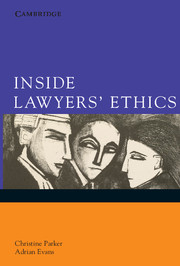Book contents
- Frontmatter
- Contents
- Preface
- Acknowledgments
- List of tables
- List of figures
- List of illustrations
- List of case studies
- Table of statutes
- Table of cases
- 1 Introduction: Values in Practice
- 2 Alternatives to Adversarial Advocacy
- 3 The Responsibility Climate: Regulation of Lawyers' Ethics
- 4 Civil Litigation and Excessive Adversarialism
- 5 Ethics in Criminal Justice: Proof and Truth
- 6 Ethics in Negotiation and Alternative Dispute Resolution
- 7 Conflicting Loyalties
- 8 Lawyers' Fees and Costs: Billing and Over-Charging
- 9 Corporate Lawyers and Corporate Misconduct
- 10 Conclusion – Personal Professionalism: Personal Values and Legal Professionalism
- Index
- References
4 - Civil Litigation and Excessive Adversarialism
- Frontmatter
- Contents
- Preface
- Acknowledgments
- List of tables
- List of figures
- List of illustrations
- List of case studies
- Table of statutes
- Table of cases
- 1 Introduction: Values in Practice
- 2 Alternatives to Adversarial Advocacy
- 3 The Responsibility Climate: Regulation of Lawyers' Ethics
- 4 Civil Litigation and Excessive Adversarialism
- 5 Ethics in Criminal Justice: Proof and Truth
- 6 Ethics in Negotiation and Alternative Dispute Resolution
- 7 Conflicting Loyalties
- 8 Lawyers' Fees and Costs: Billing and Over-Charging
- 9 Corporate Lawyers and Corporate Misconduct
- 10 Conclusion – Personal Professionalism: Personal Values and Legal Professionalism
- Index
- References
Summary
Introduction
Lawyers in civil litigation are sometimes criticised for ‘excessively’ adversarial conduct. On the one hand we might argue that clients are entitled to expect that their lawyer will represent them as zealously as possible within the bounds of the law. Any attempt by lawyers to moderate adversarial advocacy on behalf of clients in civil litigation might be seen as an unjustifiable usurping of the role of the judge in our adversary system. On the other hand, ‘excessively’ adversarial advocacy by their lawyer might actually be harmful to clients, and we might argue that lawyers have responsibilities to truth and fairness in litigation that override clients' immediate interests.
CASE STUDY 4.1 Excessive Adversarialism
The following short case studies each set out examples of conduct that could be seen as excessively adversarial. For each case consider the following questions:
What consequences might the adversarial behaviour have for other parties? For the legal system as a whole? What about the pursuit of truth and justice? How would you feel about the outcome of each case if you were the client in that case? To what extent do you think lawyers are under any responsibility to curb the adversarialism of the process in each case? To what extent can parties (rather than lawyers) be seen as responsible for the way their case is run?
(a) Lawyers for a large multinational fast food chain routinely issue defamation writs against anyone who criticises the company on issues like its environmental responsibility, its labour standards and attitude towards union representation of its workers, the healthiness of its products, misleading and deceptive advertising, and advertising aimed at children.
- Type
- Chapter
- Information
- Inside Lawyers' Ethics , pp. 66 - 95Publisher: Cambridge University PressPrint publication year: 2007

